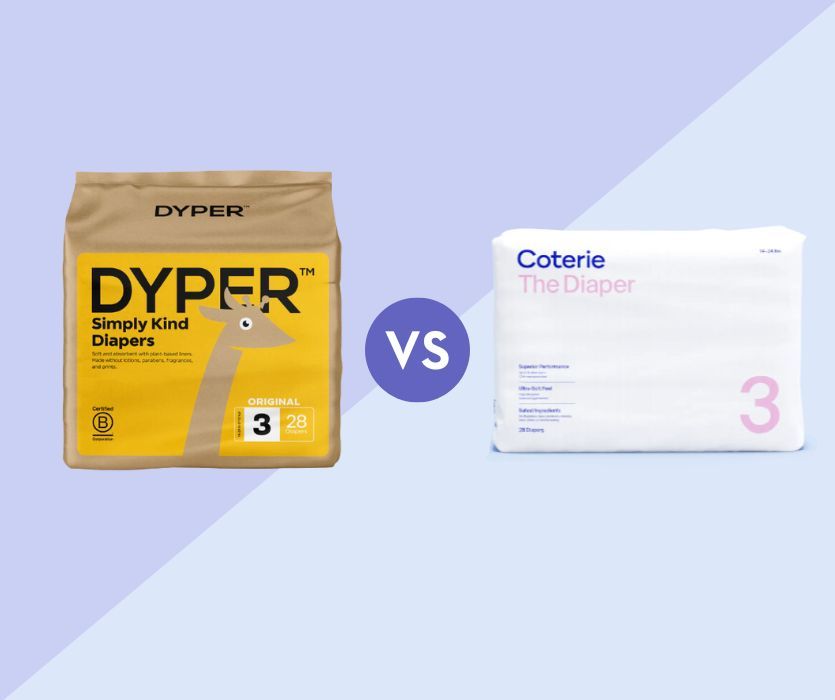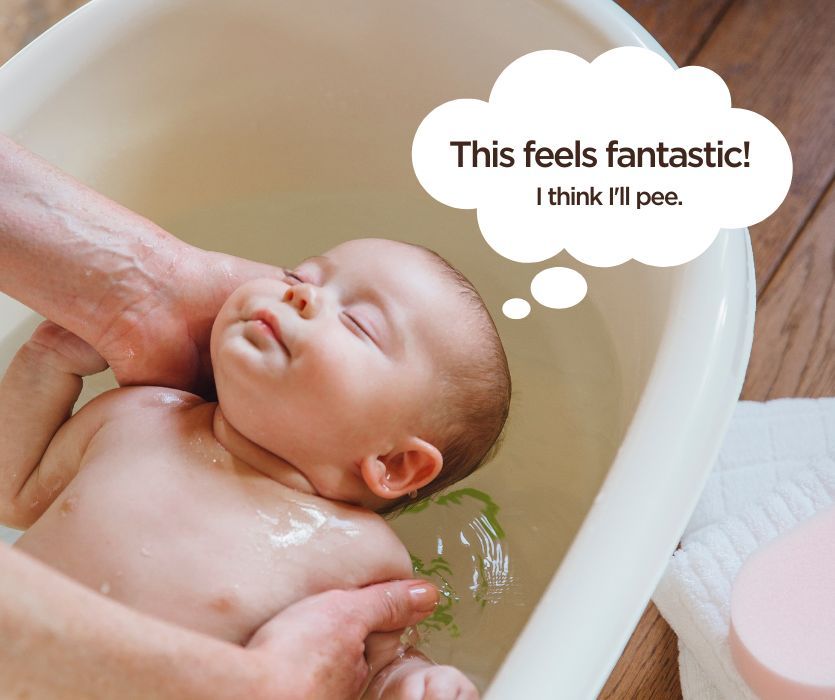During the obsessive research phase of my first pregnancy, I was pretty horrified to learn that billions of diapers end up in landfills every year and take forever to break down. I knew I wanted something that was going to keep my baby’s blowouts at bay without containing harmful chemicals, but I also felt gross about chucking 12 diapers a day into the trash.
At that time, there weren’t a ton of options for high-quality, eco-friendly diapers, but today, many parents are raving about Dyper and Coterie – two premium diaper brands that care about your baby’s bum as much as they do about environmental sustainability.
A Bit Of Background
Dyper was founded in 2018 by Segio Radovcic, a dad who wanted to make sure his baby daughter had ready access to chemical-free diapers that weren’t going to wreak havoc on the environment.
Coterie came onto the scene in 2019 when Frank Yu realized that the high-quality diapers he had seen in Japan didn’t seem to exist in the United States. Super soft, sustainable diapers and essentials that meet the needs of modern parents are the name of the game for Coterie.
Specs
Here’s a breakdown of the specs on both brands to help you decide whether to go with Dyper or Coterie, including materials, ingredients, absorbency, environmental impact, subscription availability, retailers, and price.
Materials
Both brands have a commitment to creating comfortable diapers made of high-quality materials.
Coterie uses a blend of responsibly sourced, plant-based materials and a sustainably sourced wood pulp core. The super soft outer layer is designed to minimize irritation and maximize breathability. The waistband provides a snug fit to keep things put.
Dyper’s bamboo diapers are highly biodegradable, extremely soft and hypoallergenic, making them great for sensitive skin. The stretchable tabs and waistband keep things comfy and snug.
Winner: Dyper diapers are the way to go if you’re looking for materials that are great for your baby and will break down faster in a landfill.
Ingredients
Okay, there’s a lot to dig into, so here’s what both brands have in common:
- Both are free of fragrances, lotions, latex, dyes, heavy metals, parabens and harsh chemicals like TBT (tributyltin) and phthalates.
- Both use polypropylene in their diaper designs. It’s a pretty standard material used in disposable diapers, and it helps with moisture absorption and overall fit and performance.
- Both contain sodium polyacrylate - a super absorbent polymer (SAP) - found in the core of disposable diapers to deal with leaks and keep bums dry for extended periods of time.
- Neither brand uses optical brighteners (chemicals added to make them appear brighter or whiter) in their diapers.
- Both are dermatologist-tested.
- Neither brand uses animal testing.
And here’s how they differ:
- Coterie diapers are Totally Chlorine Free (TCF) because they don’t use chlorine bleach in their materials. Dyper diapers are Elemental chlorine free (ECF). This means that they haven’t used chlorine for bleaching, but other chemicals containing chlorine are used for bleaching the wood pulp in their diapers.
- Dyper has recently released their line of charcoal enhanced diapers which are made with FSC Certified wood pulp and without chlorine, natural rubber latex, alcohol, TBT, parabens, phthalates, dyes, prints, or fragrances. They’re the first black diapers I’ve ever seen, and they look really freaking cool. (They also won a PTPA Award.)
- Dyper diapers list polyethylene as an ingredient (this is used to create the waterproof barrier). As far as I can see, polyethylene is not mentioned in the ingredients or materials on Coterie’s website.
- Only Dyper is certified Standard 100 compliant by OEKO TEX, which guarantees textiles are free from potentially harmful substances.
- Dyper is also DermaTest 5 Star Certified which means they’ve been independently tested to make sure their products are skin-friendly and safe to use.
Winner: Apart from Coterie being TCF and Dyper being ECF, there are very few differences that I can see between these two brands in terms of ingredients.
However, Dyper has gone the extra mile certification-wise with the OEKO TEX and DermaTest certifications. If independent certifications are important to you, Dyper gets extra points in the ingredients category.

Absorbency
Both brands boast high absorbency and overnight protection for your babe, and both quickly wick moisture away from baby’s skin. Dyper diapers have a pH wetness indicator, but Coterie diapers don’t. Coterie diapers boast that their diapers have up to to 70% more liquid capacity and four-times-faster absorbency than other brand, and Dyper claims that theirs absorb up to two times as much liquid as traditional diaper brands.
Winner: Honestly, the parent reviews are pretty divided on which is the better brand regarding absorbency. Many folks have mentioned the importance of ensuring that your baby is wearing the appropriate diaper size, as a diaper that’s too big or too small will lead to leaks and blowouts no matter how fantastic its absorbent core is.
Environmental Impact
According to the Federal Trade Commission (FTC), the term “biodegradable” can only be used for products that can eventually break down and return to their natural form. Using this definition, there aren’t any disposable diapers out there that are truly biodegradable.
Dyper diapers are Certified OK biobased, which measures a product’s sustainability. Dyper diapers can be composted through their REDYPER program. Although they are certified by TÜV Austria as compostable according to the ASTM D6400 standard, which specifies criteria for compostable plastics, they can’t be composted using the bin you might have at home.
Coterie focuses primarily on sustainability and using responsibly sourced, plant-based materials in their construction. There is no program available to compost their diapers.
Winner: Dyper, if you’re willing to pay for their REDYPER program.

Subscriptions
Both brands have customizable subscription services available.
Coterie offers diaper or diaper and wipe bundles. The Diaper auto-renew subscription gets you a monthly supply of diapers (from 108 to 198 per box, depending on the size) every four weeks.
When you sign up for auto renew, you get an email and SMS reminder 2 days before your next shipment processes so you have time to edit your size, shipping address, billing information, frequency (automatically set to 28 days), or delay or skip a shipment. You can also cancel at any time in your Account page, or by e-mailing or texting.
Customers can set up monthly Dyper subscriptions for diapers or training pants that can be canceled anytime through your account.
Deliveries can be rescheduled, and diaper sizes, address or payment info, frequency, and delivery dates can be changed up to one day before your next order. Subscribers get free returns or exchanges.
Dyper also has a REDYPER composting service in 21 cities that can be added to your subscription. Through this service, drivers will pick up soiled diapers on a bi-weekly schedule and be taken to a sorting facility. If you don’t live in one of the 21 cities offering curbside pickup, you can sign up for their mail-away option provided by TerraCycle at an additional fee.
Winner: Both brands offer flexible subscription services. If you are looking for the added bonus of having your diaper waste taken care of in an eco-conscious manner, Dyper gets the win here.

Retailers
If you don’t want to purchase your diapers through their website, Dyper diapers can be found at Walmart, Target, Babylist, Grove Collaborative, Whole Foods, and Amazon.
Coterie diapers can be purchased at Whole Foods, Amazon, Babylist, Zola Baby, Nanit, Potterybarn Kids, Over the Moon and Wegmans.
Winner: There are more places to purchase Coterie diapers outside of their website, but some of these stores may not be as easy to find as Walmart, so I’m going to call this one a tie.
Pricing
Coterie’s auto-renew diaper subscription gets you a monthly supply of diapers (from 108 to 198 per pack, depending on the size) every four weeks for $90 a month.
This works out to around $0.45 to $0.85 per diaper, depending on the size and subscription plan.
Dyper’s subscription boxes cost $99 per delivery (from 108 to 216 per pack, depending on the size) every four weeks.
This works out to around $0.46 to $0.92 per diaper, depending on the size and subscription plan.
If you want to sign up for the REDYPER program, you’ll have to pay an additional $20 per pickup, plus the cost of compostable bags. If you want to ship your used diapers away for composting, it’ll cost ya $149 to get set up with the return bundle.
Winner: Coterie, especially if you were planning to add on the composting option with Dyper.

Conclusion: Dyper vs. Coterie Diapers
Both brands have put in the work to make your baby’s bum feel like a million bucks.
They have been thoughtful about the ingredients and materials they’re using to construct their diapers and made sure they’re designed to minimize leaks and blowouts.
Neither brand features cutesy diaper designs in favor of keeping dyes out of their products. I think the black charcoal Dyper diapers are a cool alternative to traditional diaper design, and while your baby won’t care what their diapers look like, it’s hard to deny they’re pretty stylish (as far as diapers are concerned).
I love the effort Dyper has made to reduce the environmental impact of their diapers by making them compostable through their REDYPER program, but if you don’t live in one of the 21 US cities it’s currently available in, this option becomes really costly. I hope that over time, more cities will be eligible for the pickup option to reduce the barrier of the price.
If environmental impact is front of mind when purchasing diapers, and cost isn’t an issue, Dyper is hands-down the better option. If you don’t plan to send off your diapers for composting, the two brands are pretty close in price, with Coterie being a smidge more affordable.
Head to Dyper.com if you’d like to check out their subscription options, or Walmart, Target, Babylist, or Amazon for other buying options.
Check out Coterie.com to sign up for a subscription, or visit Amazon or Babylist to grab diapers, wipes, training pants or bundles.
If you've used either brand, let me know what you thought!
Related: 7 Diapers as Good as (or Better Than) Pampers




Leave a Comment